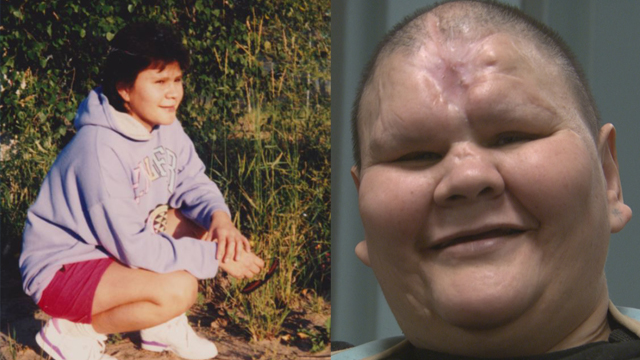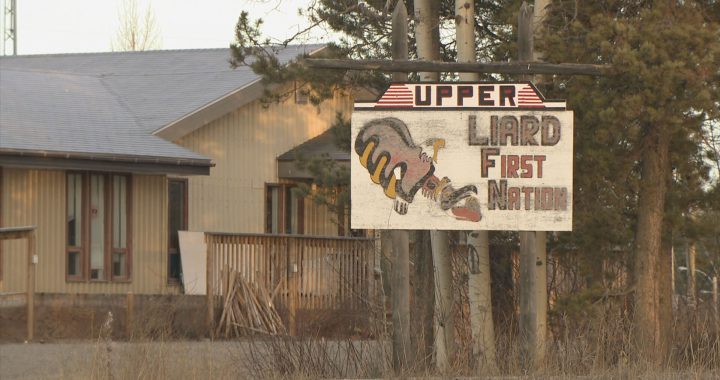
Marlene Carter as she used to appear and how she looks now after years behind bars.
Nation to Nation
Marlene Carter is a Cree woman from the Onion Lake First Nation in Saskatchewan and she’s been incarcerated since 2009.
A lot of that time has been spent in restraints – sometimes months at a time at Saskatoon’s Regional Psychiatric Centre (RPC).
A lifetime before that, the mother of three boys was sexually and physically abused as a child.
But, today no one appears to know what to do with her.
“All treatment options have been exhausted,” wrote Justice Richard Danyliuk, chairperson of the Saskatchewan Review Board, in an April 16, 2019 decision after a hearing to assess Carter’s situation.
Watch the full episode of Nation To Nation:
Due to her mental illness, Carter falls under the board’s mandate as she was found not criminally responsible for assaulting staff at the Brockville Mental Health Centre in Ontario in 2016 during a failed to attempt to treat her there. The doctor running the program told APTN News at the time the federal government didn’t properly fund the program.
Since then, APTN has been keeping track of her movements in the system – one that she appears to be perpetually trapped in.
“She languishes in the Regional Psychiatric Centre,” said Sen. Kim Pate, who first met Carter about 20 years ago.
Read More:
Cree woman serving a death sentence unless Trudeau government steps in
Pate said she last saw Carter about a month ago at RPC and she didn’t look well. Carter bangs her head on hard surfaces, which has created a large indent on her forehead.
Carter’s situation had deteriorated greatly in the 10 months before the April hearing said Danyliuk.
“Over the past year her incidents of self-harm have increased significantly,” he said. “Currently there are from zero to seven such events weekly.”
She also allegedly assaulted a staff member at RPC according to the board. She was moved back to RPC from Brockville in part to be closer to her family who live in Onion Lake.
“It was expressed that her family would be able to visit her often and give her much-needed support, and it was anticipated that her home First Nation would provide cultural and spiritual support,” said Danyliuk.
“Sadly, reality has not borne out these aspirations. Over the last 18 months Marlene has only had one family visit, from a sister. Her sons have not seen her. In total, this was the only visit.”
Danyliuk said Onion Lake has also not provided assistance.
However, a contact in the community, which was not authorized to speak publicly on the matter, told Nation to Nation that leadership wrote letters to former Public Safety minister Ralph Goodale to develop a release program into the community that never panned out.
Pate said Carter previously had two designations – one that put her under the board and the other with the correctional system, which meant Onion Lake could have qualified for special funding under the Correctional Conditional Release Act. This money could have been used to provide support in the community, such as housing and trained staff to assist Carter.
“She is no longer a prisoner, her warrant expired. So her sentence is completely expired. Now she is subject to mental health legislation,” said Pate.
That means Onion Lake no longer qualifies for funding under the conditional release act.
“I certainly want to see her out in the community,” said Pate.
Onion Lake was scheduled to meet Thursday afternoon to discuss next steps, as the board is requesting information from the community to determine if it has support to help Carter.
Meanwhile, the board said Saskatchewan is running out of options to treat Carter in the province.
“A transfer elsewhere is not an option, at least a transfer of a permanent nature. It may be that temporary arrangements with an out-of-province jurisdiction might be made,” said Danyliuk.
The board responded to Nation to Nation late Thursday, after multiple calls over several days looking for an update, to say Carter’s annual hearing was held Friday to discuss her situation but the written decision hasn’t been completed. Carter’s lawyer declined to comment without permission from Carter.













One of the first things that should be done to help ALL the patients is separate the hospital from the penitentiary completely, put a few miles/kilometers between them. How do you expect anyone to heal at all if they feel and believe they are still incarcerated. I really feel for that poor tortured soul.Hope she can get the help she truly needs,not what some bureaucrat says she needs.
The reason she is like this is being incarcerated instead of a program that may have helped her. You let killers out in 2 years and you really did a number on her. Now you want to send her back to community after screwing her up. Your funny injustice system for her.